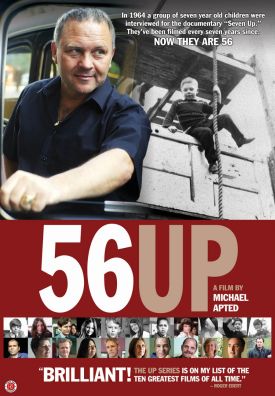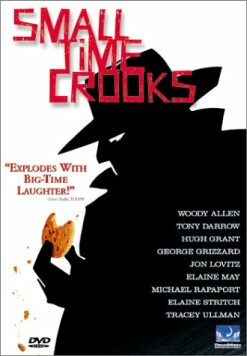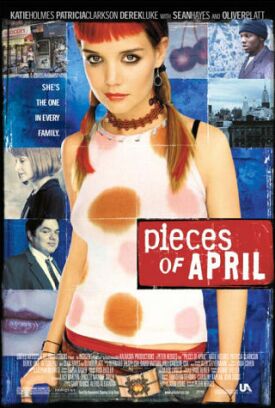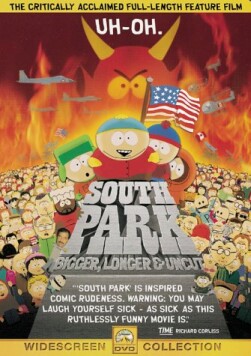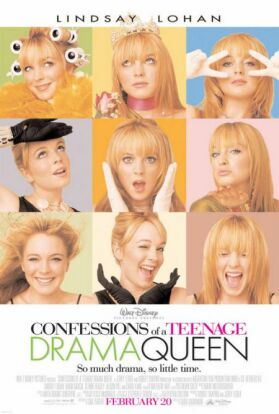56 Up
The headline of the New York Times review of Michael Apted’s 56 Up reads: “The British Class Divide, on a Personal Scale.” This refers to the eighth film in a series which has followed the same group of Britons since they were seven years old and appeared in a television documentary, Seven Up!, of 1964 directed by Paul Almond. Mr Apted, now in his 70s, was a young researcher on that show and has directed all the others as the series has returned every seven years since. The young subjects are now, or were at the time the latest film was made, 56 and are all ordinary middle-aged people, apart from appearing in what I believe to be the greatest documentary achievement in the history of film. But one of the reasons the series is so great is precisely because in their life-long perspective — for the perspective has become clear long since, though the lives are still far from being over — “the British class divide” becomes ever more trivial and inconsequential. Or rather, perhaps, we come to see class not in terms of social science but rather as a way, and not the most helpful way, of understanding character and personality as expressions of historical truths that would otherwise be cut off on the Procrustean bed of politics.
Of course, it is hopeless to expect that politics can be kept out of it. One of the participants, Peter, who dropped out of the series after 28 Up when he said something disobliging about the Thatcher government of the time, now feels confident enough to return, his opinions apparently unchanged. Another, Jackie, who has rheumatoid arthritis, is aggrieved because the current Conservative-Liberal Democratic coalition government has withdrawn the disability pension she has had for the past 14 years. The government thinks she is capable of working; she thinks she isn’t. “If David Cameron can get me a job, I will do it,” she tells the camera. A third, Lynn, also considers herself the victim of government cutbacks and complains that there is no truly left-wing party in Britain anymore, not since Tony Blair took the Labour party away from its socialist roots toward the political center.
But for the most part, politics seems not to enter into these people’s lives. Even Neil, who is a Liberal-Democratic local councillor in Cumbria and a lay minister in the Church of England appears to have no political views that translate into national terms, let alone international ones. Perhaps, however, there is a political meaning even in this lack of politics. An accidentally interesting point was made at the end of the Variety review of 56 Up when the reviewer wrote that “a complacently conservative acceptance sometimes seems to blanket all of 56 Up, as if maturity entails a serene blessing of the status quo.” It strikes me that his sarcasm is misplaced and that the complacency he deplores is really just a recognition of the fact that what maturity entails is a coming to terms with the late Baroness Thatcher’s dictum that “the facts of life are conservative.”
One thing that has changed over the years is the subjects’ self-awareness in front of the cameras — which, I take it, reflects a more general tendency for people to see themselves as reflected in the media, whether or not there is any media there to record the fact. Peter frankly acknowledges that the reason he has returned to the show — if we can think of it as one long TV series rather than eight discrete movies — after 28 years has been to promote a country and western band he is in. Tony, the delightful East Ender who as a child wanted to be a jockey, was driving a cab by 21 and now spends half the year on the beach in Spain, fondly reminisces about the time he had Buzz Aldrin in his cab and a fellow cabbie asked for his autograph rather than Aldrin’s. Several of the participants remark on their love-hate relationship with the series and their inability to turn away from its siren-song every seven years. You can’t help feeling that, like the sad hero of Matteo Garrone’s Reality, most of them find some kind of self-validation in having become minor celebrities.
Yet somehow it remains impossible to be cynical about these people or about Mr Apted’s achievement in allowing us to see them as perhaps no people in the history of the world have ever been seen before. He has found a way around the realism paradox that all photography suffers from — namely, that more you heighten the reality of the captured moment, the more you falsify it by making it momentary. The –Up series tells its subjects’ stories in something like real time and so reveals them to themselves, as much as to us, as they could never otherwise be observed. That is the context for Tony’s tearful expression of love for his wife, who has stood by him in spite of unspecified delinquencies, or Neil’s small and hard-won successes in a life dogged by failure and loneliness, or Jackie’s long history of pain and bereavement, physical and emotional, suddenly forgotten in the hope of a new love, or Paul’s finding an unexpected contentment, after having been an orphan at seven, in his own children and grandchildren. The moral implications of such things thus become tremendous — and the people themselves tremendously real.
Discover more from James Bowman
Subscribe to get the latest posts to your email.

